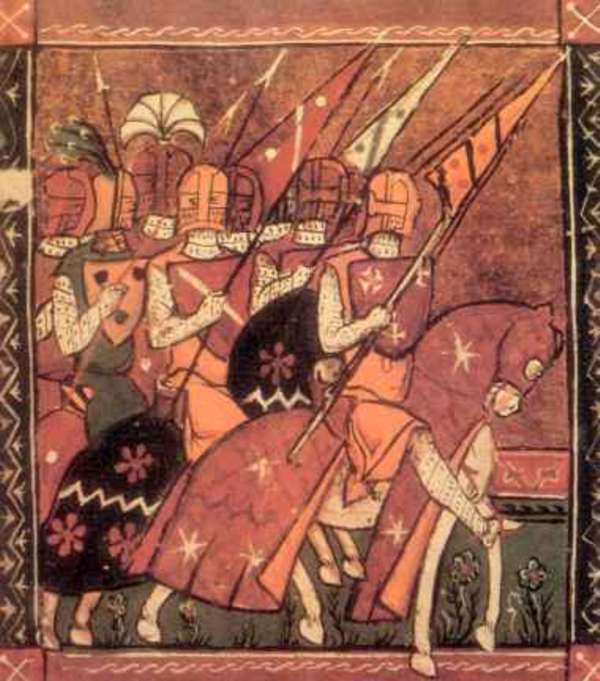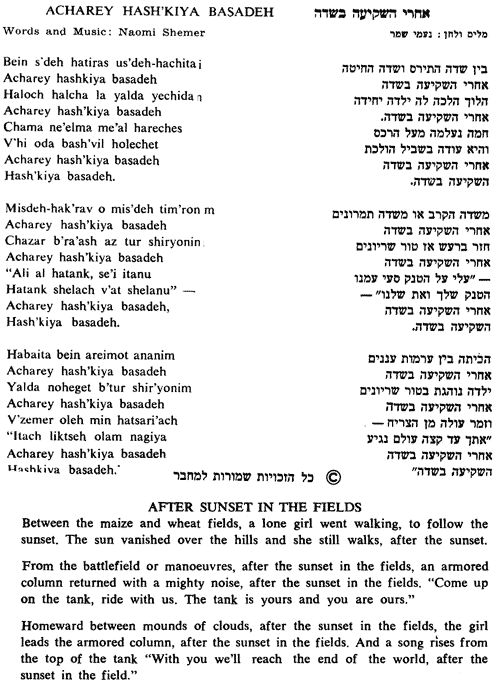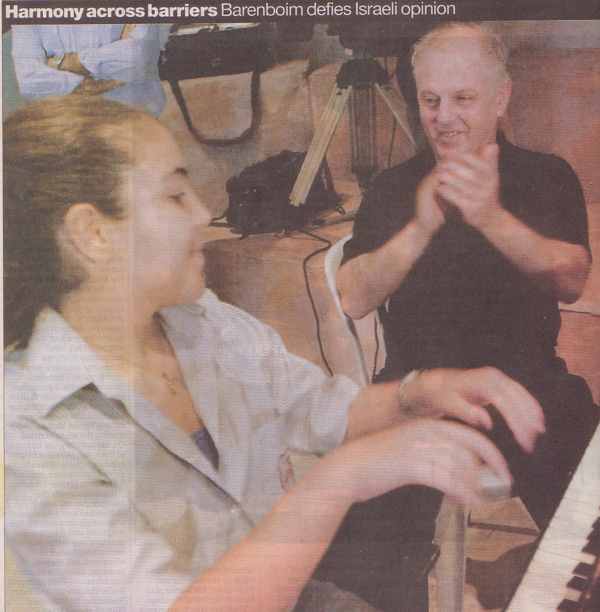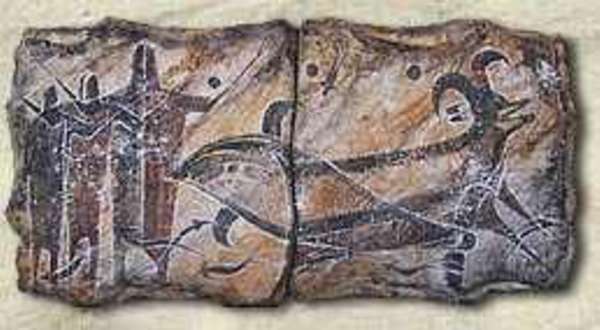
september 2004


Golden oldies
"I'm generally a very spontaneous person. That's why I avoided an answer -- so I wouldn't slip up."Naomi Shemer
By: Dr. Azmi Bishara*
August 5, 2004
 In a special memorial concert, Israel paid
tribute to the late Naomi Shemer, the composer and
lyricist whose name is most associated with songs
dedicated to the "Land of Israel" and the
Zionist experience in general, from the kibbutz to the
military unit. Her best known song, "Jerusalem of
Gold", written and composed on the eve of the
Six-Day War, became virtually the Israeli anthem for the
occupation of Jerusalem. Naomi Shemer may not have
deliberately set out to become the unrivaled champion of
Israeli patriotic songs, but she has definitely struck a
chord. Israeli audiences not only know her songs by
heart, they always chime along in unison. Few Israeli
performers combine such talent with the perfection of
Hebrew.
In a special memorial concert, Israel paid
tribute to the late Naomi Shemer, the composer and
lyricist whose name is most associated with songs
dedicated to the "Land of Israel" and the
Zionist experience in general, from the kibbutz to the
military unit. Her best known song, "Jerusalem of
Gold", written and composed on the eve of the
Six-Day War, became virtually the Israeli anthem for the
occupation of Jerusalem. Naomi Shemer may not have
deliberately set out to become the unrivaled champion of
Israeli patriotic songs, but she has definitely struck a
chord. Israeli audiences not only know her songs by
heart, they always chime along in unison. Few Israeli
performers combine such talent with the perfection of
Hebrew.Tens of thousands attended the summer concert in Yarkon Park in Tel Aviv. Dozens of top performers played her songs while documentary clips of her life flashed across an enormous video screen. And, in the open-air beneath the dome of stars, the audience sang along. In Israel, sing-alongs and other forms of collective singing -- in military units and the scouts, in the schools and youth clubs -- are more than a common form of entertainment; they are a fundamental part of strengthening the national spirit and collective memory.
The practice has been adopted by the settler movements. Sharon, in particular, is known for his fondness for singing along with his friends. Israeli leaders are not embarrassed by such vocal displays, unlike Arab leaders who seem uncomfortable even when muttering the national anthem.

In one of the scenes that appeared on the screen between songs, Israel's national songstress said, "After 'Jerusalem of Gold', many criticized me for denying the existence of the Arabs. I deny the existence of those who live on the other side of the barricade in verses such as 'The markets of old Jerusalem are deserted' and 'We no longer see women on their way to the Dead Sea.'"
In response to these verses, Amos Oz had observed that the markets of Jerusalem were teeming with Arabs and that women -- by which he meant Arab women -- still flocked to the Dead Sea. She then says, "I'm generally a very spontaneous person. That's why I avoided an answer -- so I wouldn't slip up. However, I have thought about that question for a long time and now the answer is clear to me. He [Amos Oz] says that there are people. But to me a place without Jews is a deserted place. Any place without Jews is an empty place." The scene is greeted by deafening applause. From the left and from the right comes a thundering clap to national unity. Then, after Naomi Shemer uttered these racist thoughts, with the modest and touching candor appropriate to this moving interlude in a midsummer night's dream, the audience sang along. And they swayed together as they sang, as people often do when they want to emphasize group solidarity.
A massive wave of human bodies becomes an affirmation of collective identity. Worse, schmaltzy group feeling becomes justification for the most flagrantly racist remarks. Even when qualified by such expressions as "to me", "the way I see it", or "from where I stand", such remarks do not
acquire objective or relativistic empirical grounding. Racism, however couched, is not a science; it is always an opinion, always "relative to me” or "to us ".
The entire Israeli national secular consensus was in attendance at the concert. That vast gathering was as representative as it could be of the social bases of Likud, Shinui and Labor, the very parties that are competing over the composition of a ruling coalition capable of implementing the plan for disengaging from Gaza as though it were a step towards a peace settlement. Although one of Shemer's latest songs cautions against "uprooting plants" -- in reference to the dismantling of Jewish
settlements -- most of those on hand would agree that at least some need to be torn down. Precisely which of the few settlements that should be dismantled are details. What is important is to preserve the Jewishness of the state, to preserve the sense of nationhood built around a dream that
began with the first Zionist pioneers a century ago and eventually came true, and even to preserve the dream of "Greater Israel", even if this remains no more than a dream and a patriotic song.
The three parties mentioned above, and their factions in the memorial concert's audience, are battling it out over whether or not the religious parties should be included in the next coalition. They are also fighting over the civil marriage code and a thousand other issues. However, they all agree on the need to get rid of Gaza and to build the wall. They agree on the need for restructuring the Israeli economy along the lines of the American economy and, hence, for reforms that would eliminate the Zionist socialist legacy that has entrenched itself in the form of a cumbersome public sector and large subsidies for the poor, elderly and infirm. They also all share a love for patriotic songs: songs to national unity in the face of the Arabs, songs to the Zionist past, the songs of Naomi inspired by the nationalist hue of the Zionist Labor Party and middle class consumer trends, songs to a wall between them and the Arabs.
If the words to Naomi's songs and the way they are celebrated tell us anything it is that the wall was built in the hearts and minds of the Israeli people long before it was built on the ground. The wall is there.
While the occupation is being celebrated daily behind that material and spiritual wall, repression goes ahead in the West Bank and Gaza. Israeli society takes little note. There are specialized agencies that dispatch reports, issue statements, lodge complaints and file grievances. But Israeli society as a whole, and Israeli politics as a whole, are not interested. They live behind the wall. The wall and the internal Palestinian chaos form the occupation's perjured alibi, the alibi that would have it that there's no connection between the murderer and the crime, between the blockade and its consequences, between the siege-layer and the besieged.
I am well aware that summer is the season for concerts and festivals in this region. People everywhere are on the lookout for an open-air concert, even in Ramallah, which is bending over backwards in its attempt to emulate some distorted image of Lebanon during the Civil War. Yet, in the same region in which we are living, in the same political space, people in Algeria are still being slaughtered for no other reason than madness. There are people who place bombs in the doorways of churches in Iraq, and video tapes of masked captors with blindfolded hostages in front of them have become routine. As commonplace as all these things have become, it is no excuse for Israeli society, in this hot and bloody summer, to evade its responsibility for what is taking place in the occupied territories. Israel cannot wash its hands of the consequences of its crime of occupation, which began long before all this and is still continuing.
There is something else that brings all those people together in heartwarming summertime unity, apart from open-air festivals, the beaches and holiday- making. This is the premise, which they are so keen to believe and have others believe, that states: "In the beginning was the terrorist." The Palestinians' only problem is their leadership, they say, as though the leadership created the occupation and not the reverse and as though the Palestinians had not launched "terrorist attacks" the Israeli army would never have had to go on the offensive and the occupiers would have been spared all that trouble of killing, repressing and degrading the occupied. This is the reasoning behind which an entire society can blithely turn its eyes away from their army's constant assaults on Gaza's poorer quarters, its raids on Nablus and its daily harassment of Palestinians at checkpoints. This is why that society remains unmoved by the death of Mohamed Shantir, who celebrated the end of his comprehensive examinations with two bullets in the head courtesy of an Israeli military unit on the hunt for resistance fighters in Tolkaram; by the death of Naema Abu Sahlul, 45, on 2 August in the course of the Israeli army's demolition of people's homes in Khan Yunis; by the death of nine-year-old Mohamed Zaraan on 2 July during a similar operation in Rafah; by the deaths of university lecturer Khaled Salah and his son Mohamed when their home was bombarded in spite of the fact that they had no connection with the alleged reasons for the bombardment, as is most often the case; and by the death of Mohamed Khalafullah, 75, buried beneath the rubble of his demolished home for the sin of living in Gaza in the vicinity of the Neve Dekalim settlement. The foregoing is only a small sampling of the escalating war crimes that found their way into the Israeli press in the opening month of the summer holiday.

Season’s change, from summer to winter and back, but the season of the occupation and its crimes in the West Bank and Gaza has lasted since 1967.The crimes have become so routine that they barely attract attention. The danger of the Israeli case is that Israelis do not admit that their senses have been numbed and that this helps keep the routine going. On the contrary, they feel more justified than ever, especially since the near halt in terrorist operations inside Israel. This they believe must be attributed to the efficacy of their security forces, since the resistance never explicitly declared a halt to operations of a certain type as a political gesture decision or for any other purpose. Israeli politicians and average Israelis are thoroughly convinced that the combination of their security apparatus and the wall scored a great success.
But then, if Palestinian attacks have dropped so low, how do Israelis explain the daily escalation in their government's acts of aggression and repression in the occupied territories, capitalizing on the Palestinian chaos and the displays of political activists proudly brandishing their guns for the television cameras, and taking advantage of the Israelis' numbness and the distraction of the region's summer concerts and festivals? To search for an answer on the basis of the premises of the Israeli national consensus which links "Israeli operations" in the occupied territories to "terrorism"
is a futile endeavor. There is no such relationship.
Rather, the answer is to be found in a fundamental and intrinsic relationship between perpetuating the occupation and imposing unilateral policies, and Israeli violence. Israeli violence -- or Israeli terrorism -- increases the closer they draw to the deadlines for imposing dictates on the Palestinians. Israelis would argue that were it not for the Qassam missiles fired into the Negev, Mofaz would not have given his orders to the army on 30 July to do what it takes to prevent those primitive missiles from being fired -- after an incursion into Beit Hanun the army focused its activity in the large Jabalya refugee camp. In other words, Mofaz unleashed the Israeli army on densely populated areas adjacent to the Green Line in Gaza. In Ha'aretz of 3 August, Israeli military commentator Ze'ev Schiff wrote the "concept" behind the IDF's activities in Gaza "is for the local community to learn that there is a price to be paid by the community for allowing rocket fire from the area." It makes little difference that those who have to "pay the price" are Palestinians who happen to find themselves at "the crossroads of Rafah and the Erez junction," or even Palestinians living "in northern Gaza towns and communities". The strategy is to make the Palestinians suffer so that they behave themselves quietly and correctly under the occupation. "And what of it?" would ask the hundreds of thousands steeped in the Israeli culture celebrated in Naomi Shemer's songs. After all, those areas are not inhabited by Jews, so "to us" they are just "empty" and "deserted".

While writing this article I learned of the fire in a consumer palace in Paraguay. Three hundred people were burned to death in a mall. Apparently the owners of the mall had locked the doors when the fire broke out to keep the customers from running away without paying. Israel did something slightly different. It locked the doors to the whole of Gaza, and then set fire to it.
Dr. Azmi Bishara* Member of the Israeli Knesset from Nazareth. He is heading the National
Democratic Coalition "Balad".
http://www.amin.org/eng/azmi_bishara/2004/aug05.html
http://www.gilad.co.uk
